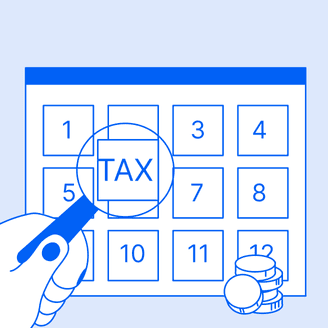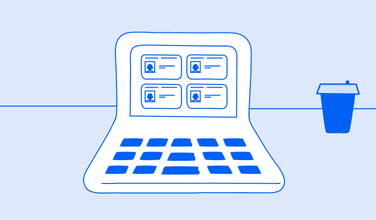- Osome Blog UK
- 2025-2026 Tax Year Dates
Tax Year Dates: Complete Guide to UK Tax Deadlines 2025-2026
- Published: 13 January 2026
- 7 min read
- Taxes & Compliance, Running a Business


Ruth Dsouza
Author
Ruth Dsouza Prabhu is a content developer who specialises in crafting clear, compelling narratives from complex ideas. With expertise in marketing communications and lifestyle writing, she simplifies business concepts for a wide audience. Her writing blends strategy, storytelling, and thought leadership, always with a focus on clarity, credibility, and meaningful impact.

Mosan Ali
Reviewer
Mosan Ali is our Accounting Manager based in the UK and has a wealth of knowledge of UK GAAP, VAT, and PAYE. With 12 years of experience crunching numbers and ensuring compliance, he keeps our financial reporting ship-shape. Think of Mosan as our blog's accounting guru. He carefully reviews our UK-focused content, ensuring it's accurate, up-to-date, and packed with helpful tips for UK businesses. Get your taxes right from day one with our informative blog posts.
Understanding important tax year dates is essential for every business owner, self-employed individual, and company director in the UK. Missing key tax dates can lead to substantial penalties, interests, and unnecessary stress, all of which can be avoided with proper planning. Whether you’re filing a self assessment tax return, managing corporation tax obligations, or handling VAT requirements, knowing your tax deadlines throughout the financial year is crucial for staying compliant with HM Revenue and Customs.
Key Takeaways
- The UK tax year starts on April 6 and ends on April 5 of the following year, with the 2024-25 tax year ending on 5 April 2025 and the 2025-26 tax year starting the next day. Knowing these dates helps individuals and businesses effectively plan their affairs for the tax year.
- Key deadlines for self assessment tax returns include 31st October for paper tax returns and 31st January for online tax returns. Missing these dates can result in penalties and interests from HM Revenue and Customs.
- Corporation tax returns and payments are due nine months and one day after a company’s accounting period ends. Staying on top of these deadlines is important to avoid late payment fines and manage cash flow.
When Does the UK Tax Year Start and End?
The UK tax year runs from 6 April to 5 April the following year. For example, the last tax year (2024-25 tax year) began on 6th April 2024 and ended on 5th April 2025. The 2025-26 tax year started the day after, on 6th April 2025. This tax year period applies to income tax, capital gains tax, and personal allowances for individuals and businesses across the country. This consistent annual cycle means that each new tax year begins precisely when the previous tax year ends, creating a continuous timeline for tax filing and payments.
Unlike many other countries that use the Gregorian calendar year for tax purposes, the UK tax year, which ends on 5th April, offers specific advantages for seasonal businesses and helps distribute the administrative workload across different periods of the year.
Osome’s company registration and accounting services help you meet all key tax year deadlines with ease. From self-assessment tax returns for self-employed individuals and small businesses to corporation tax, and returns for VAT-registered businesses, let Osome handle your filings so you can focus on growing your business.
Key Tax Deadlines for 2025-26 Tax Year
Staying on top of key tax year dates is vital to avoid penalties and manage your tax bills efficiently. Below is a concise table highlighting the most critical tax dates for the 2025-26 UK tax year that every taxpayer should be aware of.
Date | Deadline/Event | Description |
|---|---|---|
| 31 October 2025 | Paper Tax Return Deadline | Last day to submit self assessment tax returns in paper format; online returns have later deadlines. |
| 31 January 2026 | Final Day for Online Tax Return & Payment | Deadline for filing online self assessment tax returns online and paying any tax owed for the previous tax year. |
| 5 April 2026 | End of the Tax Year | Final day to use annual allowances, make pension contributions, and claim tax reliefs for the year. |
| 6 April 2026 | Start of New Tax Year | Beginning of the 2026-27 tax year with new allowances and tax planning opportunities. |
| 31 July 2026 | Second Payment on Account | Second advance payment for self assessment tax with tax bills over £ 1,000 is due. |
Tax Deadlines by Business Type
Different business structures face varying tax obligations and deadlines throughout the year, each with specific requirements that must be met to maintain compliance with tax law.
Self Assessment tax dates
Self-assessment taxes apply to self-employed individuals, landlords, high earners over £ 100,000, and company directors with multiple income sources.
Key deadlines for the 2025-26 tax year are summarised below:
Date | Deadline/Event | Description |
|---|---|---|
| 6th April 2026 | Start of Filing Period | Online self assessment tax return for 2025-26 begins. |
| 31st July 2026 | First Payment on Account Deadline | Advance payment due for taxpayers with tax bills over £ 1,000 in the previous year. |
| 5th October 2026 | Registration Deadline | New self-employed and untaxed income taxpayers must register by this date. |
| 31st January 2027 | Online Filing and Payment Deadline | Final date for submitting online tax returns and paying any tax owed. |
Meeting these key dates helps avoid penalties and interest. Registering by 5 October ensures you receive your Unique Taxpayer Reference in time. Filing early from 6 April allows faster processing. Payments on account spread your tax liability into manageable instalments.
Limited Company (LTD) tax deadlines, including corporation tax
Limited companies have several key dates throughout the year, which vary based on when their fiscal years end. Managing these important dates carefully is essential to maintain compliance and avoid penalties.
Deadline | Description | Timeframe |
|---|---|---|
| Annual Accounts Submission | Submit annual accounts to Companies House, disclosing financial position and performance. | Within 9 months after fiscal year ends |
| Corporation Tax Payment | Pay corporation tax based on profits made during the accounting period. | 9 months and 1 day after fiscal year ends |
| CT600 Company Tax Return Filing | File the company’s tax return detailing tax calculations and supporting corporation tax payment. | Within 12 months after fiscal year ends |
| Confirmation Statement Submission | Update Companies House with company structure and key personnel information. | Every 12 months from incorporation or last submission |
| Dormant Accounts Submission | For companies not actively trading, submit dormant accounts to maintain compliance. | Within 9 months after fiscal year ends |
Adhering to these deadlines ensures that your limited company stays compliant with UK tax laws. Be sure to file any untaxed income before the deadline and pay back any tax owed to avoid further penalties and interest charges.
LLP (Limited Liability Partnership) tax deadlines
Limited Liability Partnerships (LLPs) have specific filing deadlines that vary depending on the tax status of their partners. Understanding these deadlines is essential for maintaining compliance and avoiding penalties.
Partner Type | Filing Deadline (Paper) | Filing Deadline (Online) | Notes |
|---|---|---|---|
| Individual Partners | 31 October following tax year | 31st January following tax year | Aligns with personal self assessment tax return deadlines for individual partners |
| Corporate Partners Only | 9 months after the end of the tax year | 12 months after the end of the tax year | Reflects extended deadlines for filing consistent with corporate tax obligations |
In addition to tax return filings, LLPs must submit the following documents as well by the deadlines for filing:
- Confirmation Statements: Due every 12 months from the firm’s incorporation date or 12 months after the last statement submission. There is a 14-day window to file after each 12-month period ends.
- Annual Accounts: Must be submitted to Companies House within 9 months after the end of the LLP’s financial year. This ensures transparency regarding the partnership’s financial status and business activities.
Adhering to these deadlines helps LLPs stay compliant with UK tax laws and maintain good standing with regulatory authorities.
Employer and Indirect Tax Deadlines
Businesses with employees and those registered for VAT face additional ongoing obligations throughout the year, requiring consistent attention to monthly and quarterly deadlines.
VAT filing and payment deadlines
VAT-registered businesses must submit their VAT return and make digital or postal payments within 1 month and 7 days after each quarter's end, creating quarterly deadlines that fall on the 7th of each month following the VAT period conclusion.
Here is a table outlining the VAT quarters alongside their corresponding submission deadlines:
VAT Quarter Period | Start Date | End Date | Submission & Payment Deadline |
|---|---|---|---|
| Quarter 1 | 1 January | 31 March | 7 May |
| Quarter 2 | 1 April | 30 June | 7 August |
| Quarter 3 | 1 July | 30 September | 7 November |
| Quarter 4 | 1 October | 31 December | 7 February (following year) |
The annual VAT threshold currently stands at £ 90,000 for mandatory registration, meaning businesses with turnover above this level must register for VAT and begin submitting quarterly returns within the required timeframes.
Making Tax Digital requirements now apply to all VAT-registered businesses, mandating the use of compatible software for record-keeping and return submission, fundamentally changing how businesses manage their VAT obligations and maintain compliance.
PAYE and employer submission deadlines
Employers must make PAYE payments by the 19th of the following month for postal payments or by the 22nd for electronic submissions, creating monthly obligations that require consistent cash flow management and payroll processing accuracy.
These monthly deadlines apply throughout the year, meaning employers face 12 separate payment obligations annually, each requiring accurate calculation of income tax, National Insurance payments, and pension contributions for all employees during the relevant timeframes.
Monthly Tax Calendar for 2026
Paying taxes on time and accurately requires understanding the specific deadlines that fall throughout 2026, helping you avoid penalties and manage cash flow effectively across the entire year.
January to March 2026
January represents the most intensive month for tax deadlines, with key dates including:
- 7th January: VAT return deadline for the previous quarter
- 19th-22nd January: PAYE postal payments and online payments due.
- 31st January: Self-assessment tax return deadline for self-employed, both filing and payment.
February brings obligations for companies with April year-ends, featuring:
- 1st February: Corporation tax payment for the previous year’s bill
- 7th February: VAT return deadline
- 19th February: PAYE first payment due
March focuses on new tax year preparations as the current tax year approaches its conclusion, including:
- 7th March: VAT return deadline
- 19th March: PAYE payment deadline
- Planning for year-end opportunities and next year’s tax strategy
April to June 2026
April marks a significant transition with the new tax year starting on the 6th, triggering fresh allowances and new planning opportunities. Important deadlines and obligations in April include:
- Completion of End of Year PAYE submissions
- VAT return due on the 7th
In May, key dates to remember are:
- 31st May: P60 distribution deadline, requiring employers to provide annual summaries to all employees
- Corporation tax payments due for various company year-ends
- VAT return deadline on the 7th continues
June involves multiple compliance requirements such as:
- Corporation tax return submissions for companies with various year-ends
- Quarterly VAT return due on the 7th
- PAYE payment obligations on the 19th
These monthly deadlines highlight the importance of staying organized and compliant throughout the tax year.
July to September 2026
July features the critical second payment on account deadline on the 31st for self assessment taxpayers, Class 1A National Insurance payments for employer-provided benefits, and the standard VAT return submission on the 7th.
August includes:
- Corporation tax payments and return submissions for companies with different financial year ends
- The monthly VAT return deadline on the 7th
- PAYE payment obligations on the 19th
September involves:
- Corporation tax deadlines for specific company year-ends
- VAT return submissions on the 7th
- PAYE payments on the 19th
- Businesses beginning preparation for the final quarter of the year
October to December 2026
October includes:
- Paper self assessment deadline on the 31st for the previous tax year, with most taxpayers benefiting from online tax return systems that offer extended deadlines and faster processing.
November involves:
- Corporation tax payment obligations for various companies.
- VAT return deadline on the 7th.
- PAYE payments due on the 19th.
- Year-end planning activities for businesses.
December focuses on:
- Year-end planning and preparation.
- Corporation tax deadlines for specific company year-ends.
- Final VAT return of the year due on the 7th.
- Businesses preparing for the upcoming tax season and new year obligations.
Penalties and Interest for Missing Deadlines
Understanding the financial consequences of missing tax deadlines highlights the importance of maintaining accurate records and meeting payment obligations on time. Below is a summary of common penalties and charges associated with late submissions and payments for various tax types in the UK.
Tax Type | Late Filing Penalties | Late Payment Penalties & Interest |
|---|---|---|
| Self Assessment | £ 100 automatic penalty after 31 January; £ 10 daily penalties up to £ 900 after 3 months; further penalties of 5% of tax due or £ 300 at 6 and 8 months (whichever is greater) | 5% of outstanding tax after 30 days; additional 5% charges at 6 and 12 months; daily accruing interest throughout delay period |
| Corporation Tax Return | 1 day late: £ 100; 3 months late: additional £ 100; 6 months late: HMRC estimates tax bill and adds 10% penalty on unpaid tax; 12 months late: further 10% penalty on unpaid tax | Interest charged on unpaid tax from due date |
| Company Accounts (Companies House) | £ 150 for up to 3 months late; £ 375 for 3-6 months late; £ 1,500 for over 6 months late | No interest charged; fixed fines apply for late filing |
| VAT | Surcharge liability notice after late submission; percentage-based penalties on future VAT bills for repeated late returns | Interest charged on late payments |
| PAYE | Penalties based on number of late payments; starting at 1% of monthly payment for occasional delays; up to 4% for persistent late payments | Interest charged on late payments |
Late penalties can accumulate quickly, significantly increasing the amount owed and potentially impacting cash flow. Staying aware of deadlines and submitting returns and payments on time is essential to avoid these additional costs.
How to Avoid Missing Tax Deadlines
Avoiding costly penalties and stress is easier with proactive planning and organisation. Here are key steps to stay on track:
- Set calendar reminders for all tax deadlines to allow time for preparation and payments.
- Submit returns early to allow for corrections and smoother payment arrangements.
- Use HMRC online services for faster processing, instant confirmation, and extended deadlines.
- Arrange direct debits for regular payments like PAYE and VAT to avoid missed deadlines.
- Contact HMRC promptly if facing payment difficulties to set up payment plans and avoid penalties.
- Seek professional tax advice for complex situations involving multiple income sources or business changes.
Following these steps helps ensure timely compliance and avoid fines, penalties, and interest charges.
How Osome Can Help
Paying taxes across multiple deadlines and business structures can be challenging. Osome offers comprehensive services, including annual filings, Corporation tax return (CT600) preparation, Confirmation statement submissions, self-assessment tax return handling from income calculation to payment arrangements, and VAT filing and registration assistance. Additionally, our experienced team provides tax investigation support, ensuring accurate, timely compliance while protecting your business interests throughout the process.
Summary
Navigating tax year dates and deadlines is crucial for individuals and businesses in the UK to stay compliant and avoid penalties. The UK tax year runs from April 6 to April 5, with key deadlines for self-assessment tax returns for the self-employed, corporation tax, VAT, and PAYE payments spread throughout the year. Understanding these important tax year dates, registering on time, filing returns promptly, whether online or on paper, and paying taxes by the due dates can help you avoid fines and interests. Proper planning and using HMRC’s making tax digital portal or professional tax advice can simplify managing your tax obligations and keep your finances on track.






